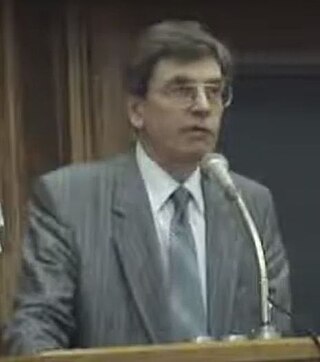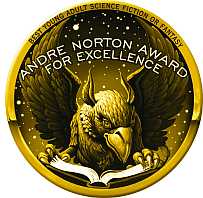Neutronium is a hypothetical substance made purely of neutrons. The word was coined by scientist Andreas von Antropoff in 1926 for the hypothetical "element of atomic number zero" that he placed at the head of the periodic table. However, the meaning of the term has changed over time, and from the last half of the 20th century onward it has been also used to refer to extremely dense substances resembling the neutron-degenerate matter theorized to exist in the cores of neutron stars; hereinafter "degenerate neutronium" will refer to this.

The Astounding Award for Best New Writer is given annually to the best new writer whose first professional work of science fiction or fantasy was published within the two previous calendar years. It is named after Astounding Science Fiction, a foundational science fiction magazine. The award is sponsored by Dell Magazines, which publishes Analog.
TRIZ combines an organized, systematic method of problem-solving with analysis and forecasting techniques derived from the study of patterns of invention in global patent literature. The development and improvement of products and technologies in accordance with TRIZ are guided by the laws of technical systems evolution. Its development, by Soviet inventor and science-fiction author Genrich Altshuller and his colleagues, began in 1946. In English, TRIZ is typically rendered as the theory of inventive problem solving.

Robert James Sawyer is a Canadian and American science fiction writer. He has had 25 novels published and his short fiction has appeared in Analog Science Fiction and Fact, Amazing Stories, On Spec, Nature, and numerous anthologies. He has won many writing awards, including the best-novel Nebula Award (1995), the best-novel Hugo Award (2003), the John W. Campbell Memorial Award (2006), the Robert A. Heinlein Award (2017), and more Aurora Awards than anyone else in history.

Genrikh Saulovich Altshuller was a Soviet engineer, inventor, and writer. He is most notable for creating the Theory of Inventive Problem Solving, better known by its Russian acronym TRIZ. He founded the Azerbaijan Public Institute for Inventive Creation and was the first President of the TRIZ Association. He also wrote science fiction under the penname Genrikh Altov.

Michael Diamond Resnick was an American science fiction writer and editor. He won five Hugo awards and a Nebula award, and was the guest of honor at Chicon 7. He was the executive editor of the defunct magazine Jim Baen's Universe, and the creator and editor of Galaxy's Edge magazine.
The Nebula Award for Best Novel is given each year by the Science Fiction and Fantasy Writers Association (SFWA) for science fiction or fantasy novels. A work of fiction is considered a novel by the organization if it is 40,000 words or longer; awards are also given out for pieces of shorter lengths, in the categories of short story, novelette, and novella. To be eligible for Nebula Award consideration, a novel must have been published in English in the US. Works published in English elsewhere in the world are also eligible, provided they are released on either a website or in an electronic edition. The award has been given annually since 1966. Novels which were expanded forms of previously published stories are eligible, and novellas published individually can be considered as novels if the author requests it. The award has been described as one of "the most important of the American science fiction awards" and "the science-fiction and fantasy equivalent" of the Emmy Awards.
The Nebula Award for Best Novelette is given each year by the Science Fiction and Fantasy Writers Association (SFWA) to a science fiction or fantasy novelette. A work of fiction is defined by the organization as a novelette if it is between 7,500 and 17,500 words; awards are also given out for pieces of longer lengths in the Novel and Novella categories, and for shorter lengths in the Short Story category. To be eligible for Nebula Award consideration a novelette must be published in English in the United States. Works published in English elsewhere in the world are also eligible provided they are released on either a website or in an electronic edition. The Nebula Award for Best Novelette has been awarded annually since 1966. The Nebula Awards have been described as one of "the most important of the American science fiction awards" and "the science-fiction and fantasy equivalent" of the Emmy Awards.

Anatoly Timofeevich Fomenko is a Soviet and Russian professor of Mathematics at Moscow State University. He is well-known as a topologist and member of the Russian Academy of Sciences. He is a painter and illustrator of original artworks inspired by topological objects and structures.
The Damon Knight Memorial Grand Master Award is a lifetime honor presented annually by the Science Fiction and Fantasy Writers Association (SFWA) to a living writer of fantasy or science fiction. It was first awarded in 1975, to Robert Heinlein. In 2002, it was renamed after Damon Knight, the founder of SFWA, who had died that year.

Allen Mulherin Steele, Jr. is an American journalist and science fiction author.

The Andre Norton Nebula Award for Middle Grade and Young Adult Fiction is an annual award presented by the Science Fiction and Fantasy Writers Association (SFWA) to the author of the best young adult or middle grade science fiction or fantasy book published in the United States in the preceding year. It is named to honor prolific science fiction and fantasy author Andre Norton (1912–2005), and it was established by then SFWA president Catherine Asaro and the SFWA Young Adult Fiction committee and announced on February 20, 2005. Any published young adult or middle grade science fiction or fantasy novel is eligible for the prize, including graphic novels. There is no limit on word count. The award was originally not a Nebula Award, despite being presented along with them and following the same rules for nominations and voting, but in 2019 SFWA announced that the award was considered a Nebula category.
The Ray Bradbury Nebula Award for Outstanding Dramatic Presentation is given each year by the Science Fiction and Fantasy Writers Association (SFWA) for science fiction or fantasy dramatic works such as movies or television episodes. To be eligible for Nebula Award consideration a work must be published in English in the United States. Works published in English elsewhere in the world are also eligible provided they are released either on a website or in an electronic edition. Only individual works are eligible, not serials such as television series, though miniseries of three or fewer parts are allowed. The award, named to honor prolific author and screenwriter Ray Bradbury, was begun in 1992 as the Ray Bradbury Award for Outstanding Dramatic Presentation. It was not considered a Nebula Award, despite being awarded at the same ceremony, and was chosen by the President of SFWA instead of by a vote. This form of the award was given in 1992, 1999, 2001, and 2009. In 2010, the Nebula Award for Best Script, which was awarded for scripts from 1974 to 1978 and from 2000 to 2009, was discontinued. The Ray Bradbury Award, though still not considered an official Nebula category, was converted to follow the normal nomination and voting procedures of the Nebula Awards in its place. In 2019 SFWA announced that the award was considered a Nebula category, and the following year the award was retitled the Ray Bradbury Nebula Award for Outstanding Dramatic Presentation.

The Nebula Awards annually recognize the best works of science fiction or fantasy published in the United States. The awards are organized and awarded by the Science Fiction and Fantasy Writers Association (SFWA), a nonprofit association of professional science fiction and fantasy writers. They were first given in 1966 at a ceremony created for the awards, and are given in four categories for different lengths of literary works. A fifth category for film and television episode scripts was given 1974–78 and 2000–09, and a sixth category for game writing was begun in 2018. In 2019 SFWA announced that two awards that were previously run under the same rules but not considered Nebula awards—the Andre Norton Award for Middle Grade and Young Adult Fiction and the Ray Bradbury Award for Outstanding Dramatic Presentation—were to be considered official Nebula awards. The rules governing the Nebula Awards have changed several times during the awards' history, most recently in 2010. The SFWA Nebula Conference, at which the awards are announced and presented, is held each spring in the United States. Locations vary from year to year.

Aliette de Bodard is a French-American speculative fiction writer.

The Hugo Award is an annual literary award for the best science fiction or fantasy works and achievements of the previous year, given at the World Science Fiction Convention (Worldcon) and chosen by its members. The award is administered by the World Science Fiction Society. The Hugo is widely considered the premier award in the science fiction genre, and winners are often noted on book covers. It is named after Hugo Gernsback, the founder of the pioneering science fiction magazine Amazing Stories. Hugos were first given in 1953, at the 11th World Science Fiction Convention, and have been awarded every year since 1955.

Ken Liu is an American author of science fiction and fantasy. Liu has won multiple Hugo and Nebula Awards for his novel translations and original short fiction, which has appeared in F&SF, Asimov's, Analog, Lightspeed, Clarkesworld, and multiple "Year's Best" anthologies.
Zhuravlyov or Zhuravlev is a Russian surname derived from журавль, the Russian word for crane. Notable people with the surname include:
Zhuravleva Tatiana Alexandrovna is a Russian discus thrower. Tatiana is a member of the Russian national team. Tatiana moved to the United States in 2011. In 2014, she won the NCAA Outdoor Championships with 56.10 m. She became third at the Russian Championship in 2014. She qualified for the World University Games in Korea in 2015. Tatiana qualified for the European Championship in 2016, but because of the ban of her country could not compete there. She is currently studying and practicing in the States.











